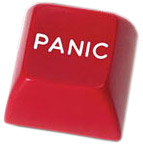A Deliberate Lack of Perspective on Terrorism?

A nice piece written by John Mueller a political science professor from Ohio State University. In this article he gives a realistic assessment the dangers terrorism poses to individuals, and contrasts that with the completely out of proportion public hysteria.
A False Sense of Insecurity?
Some interesting bits:
terrorism actually causes rather little damage, and the likelihood that any individual will become a victim in most places is microscopic. Those adept at hyperbole like to proclaim that we live in the age of terror. However, while, obviously, deeply tragic for those directly involved, the number of people worldwide who die as a result of international terrorism is generally only a few hundred a year, tiny compared to the numbers who die in most civil wars or from automobile accidents.
It should be kept in mind that Sept. 11 continues to stand out as an extreme event. Until then, and since then, no more than 329 people have ever been killed in a single terrorist attack (in a 1985 Air India explosion). And extreme events often remain exactly that -- aberrations, rather than harbingers.
A central issue, however, is whether such spectacularly destructive terrorist acts will become commonplace. Although there have been many deadly terrorist incidents in the world since 2001, all (thus far, at least) have relied on conventional methods and have not remotely challenged Sept. 11 quantitatively. If, as some purported experts repeatedly claim, chemical and biological attacks are so easy and attractive to terrorists, it is impressive that none have so far been used in Israel (where four times as many people die from automobile accidents as from terrorism). Actually, it is somewhat strange that so much emphasis has been put on the dangers of high-tech weapons in the first place.
Frantz Fanon, the 20th-century revolutionary, contended that the aim of terrorism is to terrify. If that is so, terrorists can be defeated simply by not becoming terrified -- that is, anything that enhances fear effectively gives in to them.
Accordingly, it would seem to be reasonable for those in charge of our safety to inform the public about how many airliners would have to crash before flying becomes as dangerous as driving the same distance in an automobile. It turns out that someone has made that calculation: University of Michigan transportation researchers Michael Sivak and Michael Flannagan, in an article last year in American Scientist , wrote that they determined there would have to be one set of Sept. 11 crashes a month for the risks to balance out. More generally, they calculate that an American's chance of being killed in one nonstop airline flight is about one in 13 million (even taking the Sept. 11 crashes into account). To reach that same level of risk when driving on America's safest roads -- rural interstate highways -- one would have to travel a mere 11.2 miles.
Or there ought to be at least some discussion of the almost completely unaddressed but patently obvious observation that, in the words of risk analyst David Banks, "It seems impossible that the United States will ever again experience takeovers of commercial flights that are then turned into weapons -- no pilot will relinquish control, and passengers will fight."
For their part, biological and chemical weapons have not proven to be great killers. Although the basic science about them has been well known for a century at least, both kinds of weapons are notoriously difficult to create, control, and focus (and even more so for nuclear weapons).
To this point in history, biological weapons have killed almost no one. And the notion that large numbers of people would perish if a small number of chemical weapons were to be set off is highly questionable.
What we need is more pronouncements like the one in a recent book by Sen. John McCain (R-Ariz.): "Get on the damn elevator! Fly on the damn plane! Calculate the odds of being harmed by a terrorist! ItÂs still about as likely as being swept out to sea by a tidal wave. Suck it up, for crying out loud. You're almost certainly going to be OK. And in the unlikely event youÂre not, do you really want to spend your last days cowering behind plastic sheets and duct tape? That's not a life worth living, is it?"
Moreover, there is more reputational danger in underplaying risks than in exaggerating them. People routinely ridicule futurist H.G. Wells' prediction that the conflict beginning in 1914 would be "the war that will end war," but not his equally confident declaration at the end of World War II that "the end of everything we call life is close at hand." Disproved doomsayers can always claim that caution induced by their warnings prevented the predicted calamity from occurring. (Call this the Y2K effect.) Disproved Pollyannas have no such convenient refuge.
The communication of risk, then, is no easy task. Risk analyst Paul Slovic points out that people tend greatly to overestimate the chances of dramatic or sensational causes of death, that realistically informing people about risks sometimes only makes them more frightened, that strong beliefs in this area are very difficult to modify, that a new sort of calamity tends to be taken as harbinger of future mishaps, that a disaster tends to increase fears not only about that kind of danger, but of all kinds, and that people, even professionals, are susceptible to the way risks are expressed -- far less likely, for example, to choose radiation therapy if told the chances of death are 32% rather than that the chances of survival are 68%.
I don't think it's an exaggeration to say that virtually all central governments have an interest in exaggerating foreign threats. Why? Quite simply it gives people in office power and glory. All 'war-time' leaders on the victors side are 'great', it's a lot harder to achieve that status during peaceful periods. On top of that the media and various corporate interests have an interest in encouraging, rather than discouraging, hysteria- more viewers and consumers.
Dramatic violent acts, naturally grip the minds and hearts of most people. The ability of these events to grab and hold the attention of the public doesn't just work to the advantage of the 'terrorist', but also government and a variety of other powerful well-placed folk. Savvy, selfish people love conflict because they realize the chaos and lack of rationality brings great opportunity for profit.
So I ask you, in the end, who exactly benefits from dispelling the hysteria over terrorism...aside from the public and society as a whole? ;-)






1 Comments:
Well, my answer would be 'lawyers'. One can hardly underestimate the destructive impact the notion of 'class action lawsuit' has had on Western society.
Post a Comment
<< Home